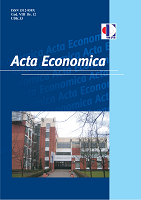АНТИКРИЗНА ПОЛИТИКА ПДВ-а И ПОШТИВАЊЕ ПРИНЦИПА ПОРЕСКЕ НЕУТРАЛНОСТИ
ANTI-CRISIS VAT POLICY AND COMPLIANCE WITH THE TAX NEUTRALITY PRINCIPLE
Author(s): Dinka AntićSubject(s): National Economy, Public Finances, Fiscal Politics / Budgeting, Socio-Economic Research
Published by: Економски факултет Универзитета у Бањој Луци
Keywords: fiscal neutrality; VAT; VAT groups;
Summary/Abstract: The fundamental assumption of theoretical VAT model lies on neutrality of VAT taxation in relation to economic position of taxpayers. Although highly relevant for removing fiscal barriers and competitiveness of national economies in the global sphere of business the principle of neutrality of VAT system is very often undermined by different measures of national VAT policy. Having intention to alleviate negative impact of global economic and financial crisis the EU members use measures in the field of consumption taxation and VAT policy, although the effects of those measures are not always coherent with fiscal neutrality principle. The recent practice of 16 EU Member States has proven that by the implementation of VAT groups the multiple benefits are achieved without a need for trade off between the costs and benefits of various measures. The concept of VAT grouping reconciles divergent interests of the main stakeholders, state, taxpayers and consumers. In the short run, an application of VAT groups may strengthen a fiscal position of governments as well as a liquidity of companies. In the long run, VAT groups affect a level of prices, employment and growth, contributing to fiscal neutrality of VAT system, economy of scale and macroeconomic stability. In addition, which is of relevance for BiH, an introduction of VAT grouping leads to structural changes within domestic market and an establishment of the single economic space.
Journal: Acta Economica
- Issue Year: 8/2010
- Issue No: 12
- Page Range: 269-291
- Page Count: 23
- Language: Bosnian, Croatian, Serbian

